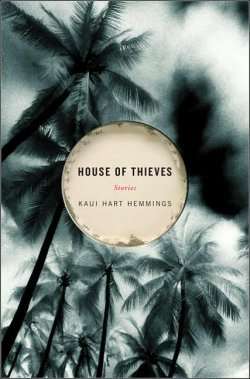
We are just heading into the month of September now, and we are finally moving full steam into our 2009 Hawaii Public Library Challenge! As mentioned previously here, we wanted to take a challenge we joined from another book blog and really amp it up as a way to support our own public libraries here in Hawaii. If you follow us on twitter (@hawaiibookblog), you will be able to track our progress under the hashtag #HPLC09 and enjoy some live and e xclusive content as we travel the island, discovering the joys of each state library on Oahu. Our tour of the libraries will begin soon, but for now I will continue with my library book choice.
The first book that I selected to read and review was the debut book from Kaui Hart Hemmings, House of Thieves (Penguin Press, 2005). House of Thieves is a nine story collection, all set in Hawaii primarily amongst upper-middle to upper class families. In Hawaii, the most important social unit is that of the `ohana, or family, and each of these stories highlights the divisive side of relationships between people in their respective `ohana. Feelings of isolation, frustration, resentment, loss, dishonesty and even hatred run through the pages of each of Hemmings’ first-person narratives.
 In “Minor Wars,” a father reexamines his relationship with his daughter as his wife, her mother, lays dormant in a terminal coma. “Final Girls” continues with the parent/child dynamic as Emma, a descendant of one of the first missionary families, struggles with slowly being isolated from her son by his skin, his sex. “House of Thieves” tells of a group of teenage girls who “hitchhike around the island looking for surf and stuff to egg.” This time the narrator is a 12-year old girl named Kora who watches as the family drama between her friend, Wendy, and Wendy’s brother unfolds. As things go from romantic to exciting to dangerous, Kora reflects on how she never wants the adventure to end. The sibling conflict follows through in “Island Cowboys,“ a story of deep resentment in which you hear the uncomfortable thoughts of an adult brother who feels he sacrificed his desires to take care of the family as he justifies a slow, simmering hatred for the brother who left and now leads an idyllic life. The final revenge is both offensive and bittersweet. This is just a sampling of the first few stories in a collection that feels both provocative and familiar.
In “Minor Wars,” a father reexamines his relationship with his daughter as his wife, her mother, lays dormant in a terminal coma. “Final Girls” continues with the parent/child dynamic as Emma, a descendant of one of the first missionary families, struggles with slowly being isolated from her son by his skin, his sex. “House of Thieves” tells of a group of teenage girls who “hitchhike around the island looking for surf and stuff to egg.” This time the narrator is a 12-year old girl named Kora who watches as the family drama between her friend, Wendy, and Wendy’s brother unfolds. As things go from romantic to exciting to dangerous, Kora reflects on how she never wants the adventure to end. The sibling conflict follows through in “Island Cowboys,“ a story of deep resentment in which you hear the uncomfortable thoughts of an adult brother who feels he sacrificed his desires to take care of the family as he justifies a slow, simmering hatred for the brother who left and now leads an idyllic life. The final revenge is both offensive and bittersweet. This is just a sampling of the first few stories in a collection that feels both provocative and familiar.
“House of Thieves,” we are told, is a literal translation in Hawaiian of Hale’iwa, the town which Kora idealizes as “the cool capital of the world.” But it also serves as a recognizable theme sewn throughout the fabric of each short story. In the title story, an antagonistic brother literally steals from his wealthy parents, including expensive Hawaiian artifacts that they may have “stolen” themselves. In “Ancient Weapons,” Mele, the daughter of Max, calls her father a “Thief” in the climax of an argument. He holds on to the ancient Hawaiian artifacts of his estranged wife—a symbolic thievery that suggests his own perceived thievery of his daughter. There is a cultural divide present between the Hawaiian and Caucasian, the local and the haole, the wealthy and the poor that manifests in the minds of many a narration, most often as a result of estranged mixed marriages or awkward exchanges. Very true to many in Hawaii, this feeling of a thievery of culture, land and identity exists—with multiple sides fighting each other in hopes of finding a way to coexist. Yet this thread in the book is weaved in such a way that Hemmings isn’t necessarily taking a side—but acknowledging that such a discord creates tension amidst the harmony of such a delicate balance.
Hemmings writes her stories with a tight narration, carefully choosing her words, stinging when she needs to and pulling back before the pain overwhelms. I found most of the stories easy to read and engaging, and in many cases consider them a different kind of escape than the usual flights into fantasy. Instead of losing myself in a world of fantastic discovery, I found myself perversely enjoying entering into the thoughts of these characters and enduring the often awkward and frustrating attempts to connect in their stressed associations. But Hemmings is careful not to delve too deeply into introspection—as most of the thoughts are formulated as a result of constant interactions with others. The only short story that deviates the most from this is “Begin With An Outline,” which also happened to be the story I felt was the weakest amongst a strong compilation.
To be blunt and a bit crass, if you enjoy short stories that deal with the dysfunctional relationships involved between family then I highly recommend House of Thieves. These are highly voyeuristic tales—there were many times when I silently gasped to myself at some of the thoughts these people would have, yet found myself relating to the often quick pangs of guilt, but not regret, associated with these feelings. Another great strength of Hemmings is her sense of humor, which fits well in this style of book and is seamlessly injected into the story, providing a realistic foil to the many heavy, uncomfortable moments. Without her quick, sardonic wit there is no way I could enjoy these stories as much as I did, as it would lack a sense of realism. Humor is often our greatest defense in times of duress, and Hemmingsuses this wisely in her work. Most of the stories end on a bittersweet, yet strangely positive note and continue to resonate in your mind long after you’vefinished. “Sometimes my prose is very effective,” decrees an overly confident teenager in the title tale. Just like our author, these carefully crafted words hit home, hit hard and hit effectively.
About the author:
Kaui Hart Hemmings grew up in Hawaii and is the stepdaughter of local surfing legend and State politician, Senator Fred Hemmings. She’s also a very funny blogger and occasional tweeter. Those of you who follow the book and film industry may have heard that The Descendants, her second book and first novel, has been optioned to be made into a feature film. This was a nice, pertinent surprise as I wrapped up reading House of Thieves. Having finished this book, I look forward to devouring The Descendants, although now I may wait until I’m in closer proximity to the movie so that I can better criticize the film for “not having the subtle nuances of the book.” On the other hand, two years ago I had told myself to read A Confederacy of Dunces before they started filming for the movie. I started the book, got distracted, and put it aside ever since—and as a result of my actions the film has been similarly sidetracked, at least until the moment I decide to cosmically set things right. I congratulate Hemmings on having her work turned into a film by such a great studio as Fox Searchlight, and can only hope this movie and the subsequent filming in Hawaii will continue to help bring our local identity and unique culture to the forefront of the national eye.




